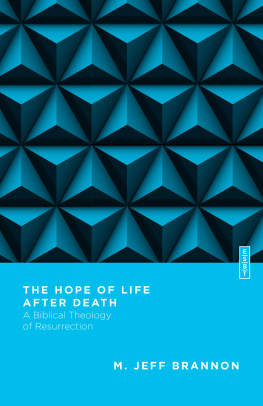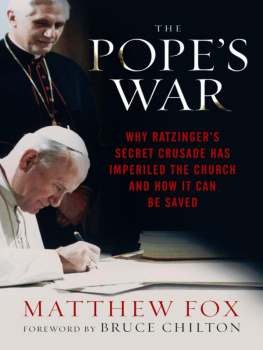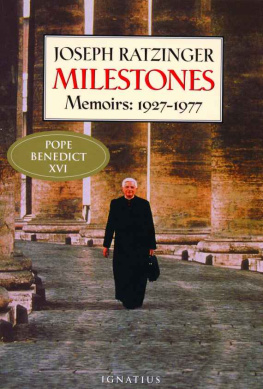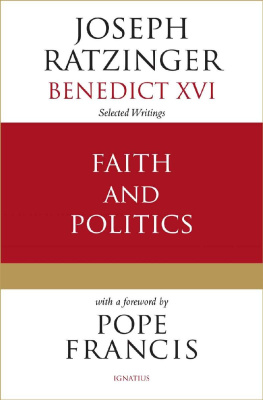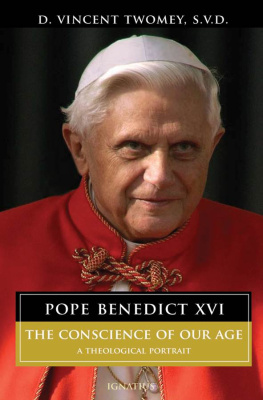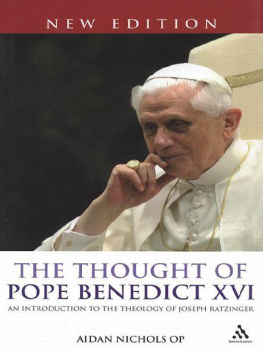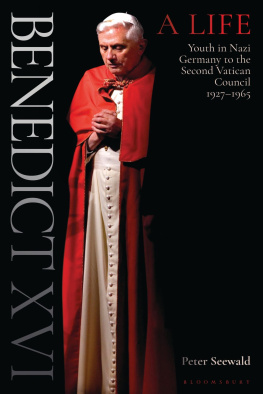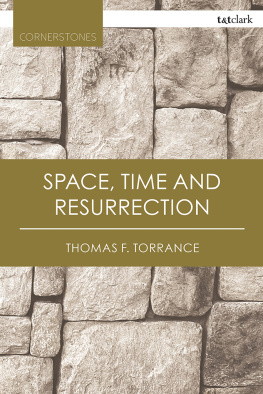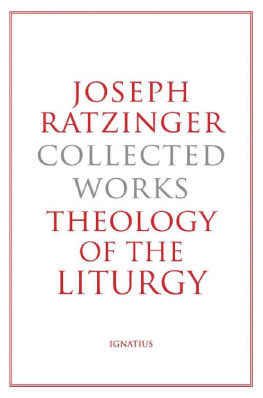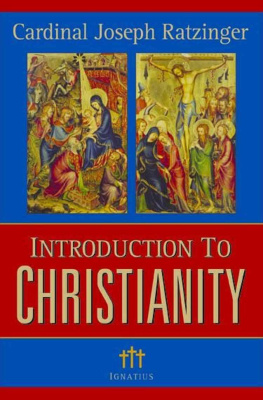Patrick J. Fletcher
Copyright 2014 Patrick J. Fletcher. All rights reserved. Except for brief quotations in critical publications or reviews, no part of this book may be reproduced in any manner without prior written permission from the publisher. Write: Permissions, Wipf and Stock Publishers, W. th Ave., Suite , Eugene, OR 97401 .
W. th Ave., Suite
Fletcher, Patrick J.
Resurrection realism : Ratzinger the Augustinian / Patrick J. Fletcher.
viii + pp. ; cm. Includes bibliographical references.
. Benedict XVI, Pope, 1927.. Catholic ChurchDoctrines.. Augustine, Saint, Bishop of HippoContributions in theology. 4. Resurrection.. Catholic ChurchDoctrinesHistory20th century. I. Title.
Manufactured in the U.S.A.
The Catholic Edition of the Revised Standard Version of the Bible, copyright 1965 , 1966 by the Division of Christian Education of the National Council of the Churches of Christ in the United States of America. Used by permission. All rights reserved.
To my wife, Corinne, whose tireless devotion to our family made all this research possible.
Introduction
F or if the dead are not raised, then Christ has not been raised. If Christ has not been raised, your faith is futile and you are still in your sins.
Corinthians :
The Resurrection of the Body: Contested throughout History
T he doctrine of the resurrection of the deadalso called the resurrection of the body and the resurrection of the fleshhas always been, and remains, central to Christian faith. In the Apostles Creed, Christians profess their belief in the carnis resurrectionem , But this belief has been a source of controversy from the earliest days of the Church, being debated and defended by generations of theologians throughout history.
Irenaeus (d. ), for example, avowed that the denial of the resurrection is at the root of every heresy: For whatsoever all the heretics may have advanced with the utmost solemnity, they come to this at last, that they blaspheme the Creator, and disallow the salvation of Gods workmanship, which the flesh truly is. By the time of Augustine (), the most serious opponents of the resurrection were those who followed the philosophy of Plato. Augustine notes the philosophical climate of his day:
Yet on no other point is the Christian faith contradicted so passionately, so persistently, so strenuously and obstinately, as on the resurrection of the flesh. Many philosophers, even among the pagans, have argued at length about the immortality of the soul, and in their numerous and various books have left it on record that the human soul is indeed immortal. But when it comes to the resurrection of the flesh they never falter, but openly and plainly deny it. So flatly do they contradict us on this that they declare it impossible for earthly flesh to ascend to heaven.
The Challenge of Platonic Dualism
The pagan philosopher Plato ( BC) continued to exert an extraordinary influence in Augustines time through those philosophers who followed and expounded his philosophy. Many of Platos statements on beatitude, however, suggest that what is required is the souls liberation from the body rather than that bodys resurrection. In the Phaedo , Plato suggests that if we are ever to have pure knowledge, we must escape from the body and observe matters in themselves with the soul by itself.
This Platonic dualism, or tendency to view soul and body as two disparate entities (one of which is ultimately non-essential to human nature), presents a strong challenge to Christian faith in the resurrection of the body. Centuries after Plato, the Platonic philosopher Plotinus ( AD) further developed Platos thought. Within his system (later dubbed Neoplatonic) Such a view clearly contradicts Christian faith in the resurrection of the body .
Augustine is important in the resurrection debate because he learned and accepted the Platonism of Plotinus and Porphyry, yet when he became a Christian he eventually rejected those beliefs of the Platonists which he considered to be incompatible with Christian faith in the resurrection. In other words, the Platonic dualism which saw the body as a lower-order reality to be left behind was not unconsciously assumed by Augustine, but rather explicitly considered and rejected. In this respect, Augustines theology of resurrection is highly significant in the development of Christian doctrine, for it was developed in conscious opposition to this Platonic dualism.
Ratzinger, Augustine, and the Modern Situation
In the nineteenth and twentieth centuries, some theologians suggested that Platonic dualism had infiltrated Christian thought to the point that biblical faith in bodily resurrection had essentially been replaced by the Platonic idea of the immortality of the soul. Notably, Oscar Cullmann ( 1902 ), a Lutheran exegete, claimed that Corinthians has been sacrificed for the Phaedo . This accusation naturally raises questions about theological anthropology and the compatibility of the body-soul schema with Christian thought. The chief problem is whether the notion of a postmortem soul, separated from its body while it awaits the resurrection, is compatible with the Christian view of the human being, which sees both body and soul as essential to human nature.
Joseph Ratzinger (b. 1927 ), who became Pope Benedict XVI in 2005 until his resignation from the papacy in 2013 ,
Ratzingers Augustinian Influence
Ratzinger has repeatedly claimed to be influenced by the thought of Augustine. His doctoral dissertation, Volk und Haus Gottes in Augustins Lehre von der Kirche ,
If, then, Joseph Ratzinger was so deeply influenced by the thought of Augustine, then an important question arises: is Ratzingers theology of resurrection Augustinian? Although Ratzinger has indicated that he was impacted by the personalism of Augustines Confessions , Indeed, references to the Augustinian character of Ratzingers theology are common, but textual support for these references is not.
What Is Augustinianism?
When it is claimed that Ratzinger is Augustinian, what is often meant is that his ecclesiology or his anthropology is marked by a pessimism toward human nature and an emphasis on the need for grace. In other words, Ratzingers Augustinianism is often seen only with respect to Augustines anti-Pelagian writings. This position is evident in books by James Corkery, Thomas Rausch, and Giancarlo Zizola. this is unfortunately done without any textual references to Augustine.
The situation mentioned above sums up well the current state of scholarship on Ratzingers relationship to Augustine, which is in general full of assertions but lacking in evidence. This is particularly true on the issue of the resurrection of the body. Even in Quys book (which is dedicated to the Augustinian nature of Ratzingers theology), there is no treatment of Ratzingers theology of resurrection at all. This situation is highly unfortunate, given both the importance of Augustine in the development of the Christian theology of resurrection and the significance of the purportedly Augustinian Ratzinger in the modern debate.


